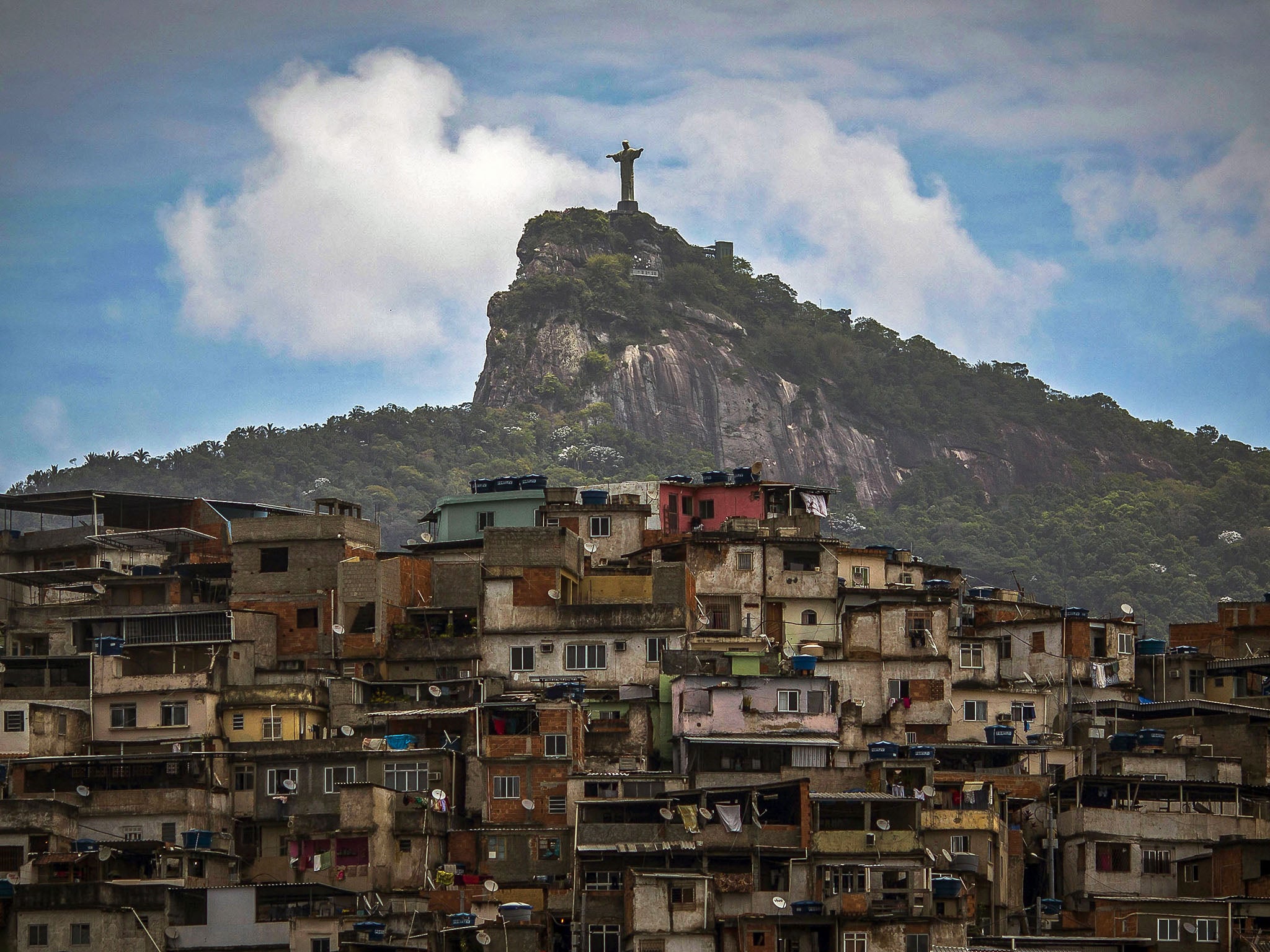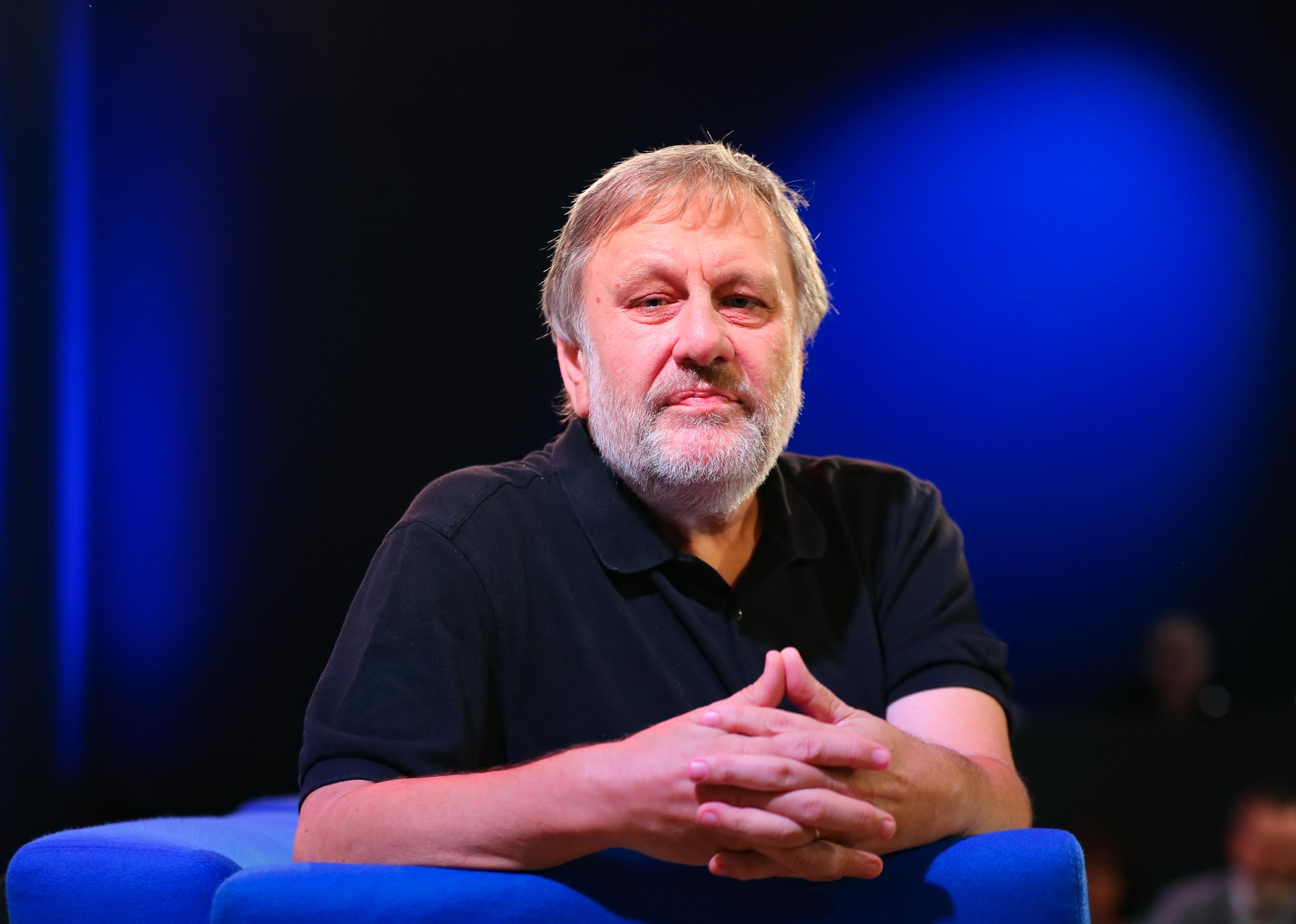Slavoj Zizek says ‘the dream of universal liberal democracy is over’
Arjun Neil Alim speaks to the west’s most dangerous philosopher on how to resist radical right, Jordan Peterson and the digital surveillance state

Sitting across from Slovenian philosopher Slavoj Žižek, I begin to discern a pattern to his thought. Things are bad, catastrophic even, but never in the way we understand. The #MeToo movement failed, not because it alienated moderate supporters, but because it didn’t go far enough in creating an authentic solidarity. China’s creeping totalitarianism is horrifying, because it disguises similar developments in the west. Favelas in Latin America are bad, because the impoverished can’t even afford to live in them anymore.
“They said that the Rwandan genocide was linked to colonialism and one of my black friends exploded, ‘you white people are so patronising, you don’t even allow us to be evil on our own’.” Žižek’s radical Marxist philosophy can only be described as pessimistic absurdism. The 70-year old thinker is explaining to me that the liberal left in the west has failed to understand identity. In creating a culture of victimisation, they have succeeded in patronising and alienating minorities: “Of course, immense injustices were done to them, but we shouldn’t say ‘so now we should show our great liberalness and give them charity’, we should empower them.”
On why only black people can use the n-word: “It is extremely racist and humiliating because it implies that blacks are like spoilt children, they are not adults like you and me, where an adult is someone who can control himself and follow certain ethical rules.”
To interview the so-called ‘Elvis of Cultural Theory’ is like playing a dozen games of chess at once, one never quite knows where the next move is coming from. Born in Tito’s Yugoslavia, he draws on an eclectic mix of experiences and ideology, including GWF Hegel and Jacques Lacan.
Now a professor of philosophy at the University of Ljubljana, Žižek has written more than 80 books, most recently The Relevance of the Communist Manifesto, Incontinence of the Void, and Living in the End Times. He is known for his adept use of popular and elite culture to illustrate his philosophical points. When I probe his choice of examples, he retorts: “This is the Hegelian lesson of concrete universality. In politics ideas are never simply universal, there is always a concrete example which gives a spin to the universal idea.”
The popularity of Žižek’s philosophy has earned him a few enemies as well. He accepted a debate with clinical psychologist and cultural conservative Jordan Peterson, who also protests “political correctness” , blaming it on “postmodern neo-Marxism”. Having gained prominence through his opposition to a Canadian law that checks gender-based discrimination, Peterson took exception to an article Žižek wrote for The Independent, in which he blamed the popularity of Peterson’s “crazy conspiracy theory” on the liberal left’s failure to confront difficult social problems. They are due to meet in Toronto on 19 April for a battle of ideas.

Any hope I have for the 21st-century’s Great Debate is shattered when Žižek confesses “nothing will come out of this debate with Jordan Peterson”. His only hope is to show people that not only the new Right decry the apparent excesses of #MeToo culture. He dismisses Peterson as a “Wikipedia theorist”.
“My basic problem with Peterson is his term ‘postmodern neo-Marxism’, which is a very strange construct. Firstly, Marxism is in itself a modernist project. When postmodernism exploded in the 1980s, its main target was precisely this Marxist narrative, so it’s crazy to bring these terms together.”
He softens his tone: “[But] I know what Peterson means; this wave of political correctness. Here I don’t like his logic, he rightly sees this antagonism in today’s society. But he doesn’t see it as inherent in society, he needs an external enemy, hence Marxism. It recalls the alt-right who talk about ‘cultural Marxism’”. The latter is a reference to the Frankfurt School of Critical Theory, which came to prominence near the end of the first half of the 20th century. Thinkers from the Frankfurt School sought to critically engage capitalist structures, but are accused by some on the Right of attempting to undermine the moral fabric of the west.
I recall Fredric Jameson’s “Postmodernism or the Cultural Logic of Late Capitalism”, which casts postmodernism as sceptical analysis of capitalist narratives, rather than simple nihilism. Žižek responds: “I am more negative towards postmodernism than my good friend Jameson. At an aesthetic level I am an old fashioned modernist – I still think the only really great thing in modern art was modernism, Kandinsky, Malevich in painting. For me, what is the typical postmodern view is basically a cynical view: we cannot get rid of theology or traditional values, but we should adopt them in a playful way, knowing they aren’t true.”
Our discussion inevitably moves to Donald Trump. “Trump is the first postmodern president. It’s so clear: can you look me in my eyes and tell me that Trump embodies traditional Christian values? My paradox is with Peterson, who is against postmodernism. My reply would be then how can you support Donald Trump?”
Žižek courted controversy in 2016 by provocatively stating that he would prefer a Trump presidency to a Hillary Clinton one. “My hope was this: Trump nonetheless introduced a deep split into American ideological hegemony. Trump is not simply an establishment figure, he is a trauma for the establishment.”
Sensing a contradiction, I query how a billionaire New Yorker and property developer is not part of the establishment. “One billionaire who didn’t support #MeToo or transgender bathrooms won. This tension is between more conservative, patriarchal ethics, and this new transgender plasticity non-fixed identity, Judith Butler logic. My central point is that this antagonism is inscribed into the core of today’s global capitalism, both foes are within the capitalism framework.”
My point is to label anti-immigrant populists as non-patriotic. They don’t trust their own nation. How can you believe like Trump in American greatness, if when a couple of thousand refugees are approaching your border you proclaim a state of emergency?
So reactionary politics is as much a feature of capitalism as hyper liberal politics. “This is why I say that for liberals, Trump is a fetish, he is the last thing they see before they are forced to confront the logic of class struggle. This is why he got the vote of dissatisfied workers. Again, this is a complex problem.”
So how does one resist the radical right? The west’s most dangerous philosopher leans in to share a secret with me. “We need to start stealing motifs from the enemy. There is nothing more vulgar than today’s Right. Look at how Trump treats supposed heroes like John McCain. Ronald Reagan preached family values but Reaganomics did more to destroy family life than all gay liberals put together.”
He becomes more animated on this point: “Why should the Left automatically accept this idea that patriotism is bad? Patriotism means for me that you have great trust in the greatness of your nation, for example what Angela Merkel did: accepting one million refugees, this is true patriotism: trusting in the greatness, tolerance, productivity of Germany.”
On this he goes for checkmate: “My point is to label anti-immigrant populists as non-patriotic. They don’t trust their own nation. How can you believe like Trump in American greatness, if when a couple of thousand refugees are approaching your border you proclaim a state of emergency?”
Having previously stated that “we were once all Fukuyama-ists” who believed in the historic ascendancy of liberal democracy, Žižek has a much graver outlook on global order today. “My general political worry is the Fukuyama liberal dream of universal liberal democracy is over. Now we are approaching a nightmare where global capitalism coexists with assertions of strong ethnic nation states. Modi’s India is an exemplary case of this: economically a ruthless neoliberal, culturally strong state.”
His prognosis for Brexit Britain is no brighter. “The EU was not, even at a purely capitalist level, so bad. At least it guaranteed certain ecological standards, respect for workers’ rights, this will now go out of the window. I do not believe the UK will be stronger after Brexit, in fact it will be marginalised.” And if Julian Assange is indeed extradited to the US, the philosopher would see this as evidence that Britain must now play second fiddle to its American partner.

I guide the discussion back to the upcoming debate with Peterson. The theme is ”Happiness: Marxism vs Capitalism”, which appears odd, given that in an interview with the New Statesman Žižek stated “happiness is for wimps”. When asked to expand on this, he adds: “I meant something very ironic. Happiness is not when you get what you want. When you get what you want you are mostly disappointed. Happiness is what you get almost what you want, but you can keep the dream alive. My most evil example: when the Soviets crushed the Prague Spring [in 1968], to provoke my leftist friends, I said that Soviet intervention saved the dream of the Prague spring from a democratic socialism that would inevitably fail.”
I convince him to explore Peterson’s ideology more deeply: “Peterson’s big authority is Dostoevsky: if God doesn’t exist, then everything is permitted. But Jacques Lacan would say no, if God doesn’t exist, everything is prohibited. For believers, everything is permitted as you claim your activity is grounded in divine will.”
“What he is doing in his clinical practice with his patients, he is installing a sense of responsibility, I support him here. But then he always goes one step too far. In his book 12 Rules For Life, I haven’t read it, but I believe he says “before you want to change the world put your own house in order”, But you can put your house in order, only if you have a certain [social] stability. Would you really be ready to say to someone living in North Korea or under ISIS ‘don’t complain, put your house in order’?” For Žižek, without social change, the problems Peterson confronts can thus never be meaningfully resolved.
On the belief that we need to install narratives into our lives, Žižek warns that ‘higher values’ can oppress us. “The most shocking thing for me is how often horrible things you do publicly can be grounded in quite beautiful spiritual narratives. My usual example is Buddhism. If you follow the history of Zen Buddhism, almost the entire group supported Japanese imperialism, and also provided justifications for their actions.”
We move on to the critical dangers of modernity, and Žižek has a warning for techno-optimists: “The sad secret of today is that we are in the middle of an exploding arms race, it’s not just nuclear arms, but ultra-powerful computers and digital weapons. The traditional argument against a police state was that it was not productive, but today the computers are so strong that their secret dream of the police state is possible. Today we have a new form of state control, which doesn’t openly impeach or limit our freedom, we still experience ourselves as totally free, but we are already controlled and manipulated, it is utterly incredible.”
Žižek is an outspoken supporter of Julian Assange, who was recently arrested in London for missing a court summons after the Ecuadorian government revoked his asylum status. The Swedish government had previously issued an international arrest warrant for charges of rape. He believes he has been arbitrarily persecuted for his actions against the US surveillance regime.
“This was the message of Assange for me, how he made us aware of new forms of control. His most important work operates through the close link between private digital corporations and the state. We should never forget this obvious fact, digital space regulates everything today: water supplies, food. Those who control the digital space control everything.”
Public space in the old sense is disappearing, on other hand, on the web there is still an alienation. It is this arena where everything, racism, violence, can flourish. Something really new is emerging here
I question whether we can label the Internet a “public space” akin to Jürgen Habermas’s coffeehouse of the 19th and 20th centuries and Žižek hesitates for the first time. “This is a big question,” he concedes. “It is not a proper public space, it is a private space rendered public, but remains private. Public space in old sense is disappearing, on other hand, on the web there is still an alienation. It is this arena where everything, racism, violence, can flourish. Something really new is emerging here.”
Drawing to a close, I score a late victory. I find an area in which Žižek is optimistic: the role of philosophy in our time. “We are confronting a whole series of new situations where old traditional ethics no longer works. We have to invent new rules.” In bioengineering, cognitive sciences: “we have to make philosophical and theoretical decisions about freedom, some kind of wild philosophy is needed. Philosophy begins for me when everyday wisdom, basic ethics and traditional wisdom are challenged.”
Hegel thought that philosophy enters on stage in times of trouble and strife. “It is good news for philosophers that philosophy will be more and more needed, but bad for the world.” He laughs, “it means we will be in more and more deep shit.”

Join our commenting forum
Join thought-provoking conversations, follow other Independent readers and see their replies
Comments
Bookmark popover
Removed from bookmarks